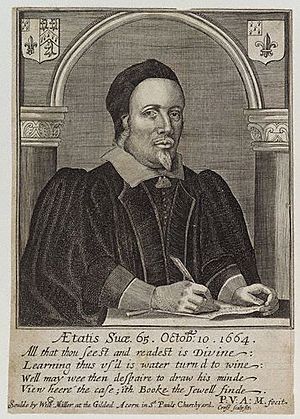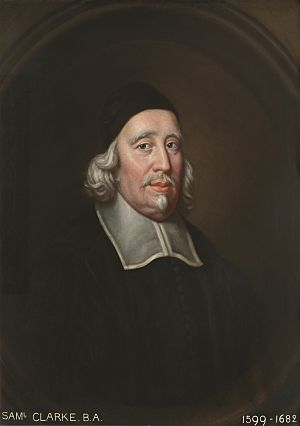Samuel Clarke (minister) facts for kids
Samuel Clarke (born October 10, 1599 – died December 25, 1683) was an English church leader. He was also a very important writer who focused on the lives of famous people, especially those with strong Puritan beliefs. Puritans were a group of Protestants who wanted to make the Church of England simpler.
Contents
Samuel Clarke's Life Story
Samuel Clarke was born on October 10, 1599, in a place called Wolston, in Warwickshire, England. His father, Hugh Clarke, was a church leader there for 40 years.
Samuel learned from his father until he was 13. Then, he went to a free school in Coventry. When he was 17, he started studying at Emmanuel College, Cambridge, a famous university.
Around 1622, Samuel became a minister. He worked in several towns, including Knowle, Thornton-le-Moors, and Shotwick. In 1626, he married Katherine Overton.
Early Challenges
Samuel Clarke was known for his Puritan ideas, which sometimes caused trouble. He became a lecturer in Coventry, but another church leader, Samuel Buggs, didn't like his views. Buggs convinced the bishop to stop Clarke from preaching there. Even though he had permission from the Archbishop, Samuel had to leave Coventry.
He found support from a powerful person, Robert Greville, 2nd Baron Brooke. Lord Brooke helped him get another lecturing job in Warwick. However, people still complained that Clarke didn't follow all the traditional church rules.
On April 23, 1633, Lord Brooke helped Samuel become the rector (main minister) of Alcester. At Alcester, Clarke became well-known for speaking out against King James I's book called Book of Sports. This book allowed sports and games on Sundays, which many Puritans disagreed with.
Working for Change
In 1640, Samuel Clarke and another minister, Arthur Salwey, were chosen to visit King Charles I. They went to York to complain about a special oath that ministers were forced to take. The King was hesitant to see them but promised they wouldn't be bothered until Parliament could discuss their concerns.
On October 23, 1642, a famous preacher named Richard Baxter was speaking for Clarke in Alcester. They heard the sounds of cannons from the battle of Edgehill, a major battle in the English Civil War. The next day, they rode to see the battlefield.
Life in London
Soon after, Clarke moved to London. He became the minister at St. Bennet Fink church. The people of the church chose him for the role. After the war ended, he left his job in Alcester to stay in London. He spent his time writing books from his study in Threadneedle Street.
Samuel Clarke was a respected figure among London's church leaders. He was a governor and president of Sion College twice. He also helped a committee that decided who could become a minister in London in 1643.
In 1649, he was one of 57 ministers who signed a protest against executing King Charles I. He also helped write a document in 1653 that defended the role of regular ministers against people who preached without formal training. In 1654, he helped a government group that removed ministers and teachers who were considered unfit.
Later Years and Legacy
When the king returned to power in 1660 (this event was called the Restoration), Clarke was chosen by London ministers to congratulate him. He also took part in the Savoy Conference, a meeting to discuss changes to the church.
In 1662, Samuel Clarke was among many ministers who were forced to leave their churches because they didn't follow new church rules. This event is known as the Great Ejection. Two of his sons and four other family members were also affected.
In 1665, he took an oath against resisting the king, as required by the Five Mile Act. A judge congratulated him for giving up his earlier beliefs, but Clarke said that wasn't his intention. To avoid any misunderstanding, he moved to Hammersmith in 1666.
Before he was ejected, Samuel Clarke performed the wedding ceremony for his friend Richard Baxter in 1662. Clarke continued to attend his local church. He later moved to Isleworth and spent his time writing popular books, especially biographies. His wife, Katherine, passed away in 1675, and he wrote a book about her life. Samuel Clarke died on December 25, 1683, in Isleworth.
Samuel Clarke's Books
Samuel Clarke was a famous biographer, which means he wrote about the lives of other people. He even used a fun anagram for himself: 'Su[c]k-all-Cream' (meaning he tried to get all the best parts, or "cream," of history for his books).
Here are some of his important biographical works:
- A Mirrour or Looking-glass both for Saints and Sinners: This book, first published in 1646, contained thousands of examples of good and bad behavior. Later versions also included descriptions of countries around the world.
- The Marrow of Ecclesiastical History: This work, from 1649-1650, contained the lives of 148 important church figures and thinkers. Later editions added lives of Christian kings and other important people.
- General Martyrologie: Published in 1651, this book told the stories of martyrs (people who died for their beliefs).
- English Martyrologie: This book, from 1652, focused on English martyrs.
- The Lives of Twenty-two English Divines: Published in 1662, this book featured the lives of 22 English church leaders.
- Lives of Ten eminent Divines: Also from 1662, this book included the lives of ten important church leaders.
- Lives of Thirty-two English Divines: A third edition of a similar work, published in 1670.
- Lives of sundry Eminent Persons in the later age: This book from 1683 included his own life story, with an introduction by Richard Baxter.
Other Writings
Besides biographies, Samuel Clarke wrote other kinds of books:
- England's Remembrancer: This book, first published in 1657, was a true story of how England was saved from the Spanish invasion and the Gunpowder Plot.
- The Saints' Nosegay: Published in 1642, this was a collection of 741 "spiritual flowers" or wise sayings.
- Medulla Theologiae: This book from 1659 discussed difficult questions about faith and morals.
- Golden Apples: Published in 1659, this book offered advice to rulers about not allowing false teachings.
- A Discourse against Toleration: This book from 1660 argued against allowing too many different religious beliefs.
- Duty of every one intending to be saved: This book from 1669 discussed what people needed to do to be saved.
- The Soul's Conflict: Published in 1678, this book included an account of Clarke's own life.
- Precedents for Princes: This book from 1680 offered examples for rulers to follow.
- Book of Apothegms: This book from 1681 was a collection of short, wise sayings.
 | Bessie Coleman |
 | Spann Watson |
 | Jill E. Brown |
 | Sherman W. White |



